The enactment of the Environmental Protection
VerifiedAdded on 2022/08/22
|11
|2796
|16
AI Summary
Contribute Materials
Your contribution can guide someone’s learning journey. Share your
documents today.
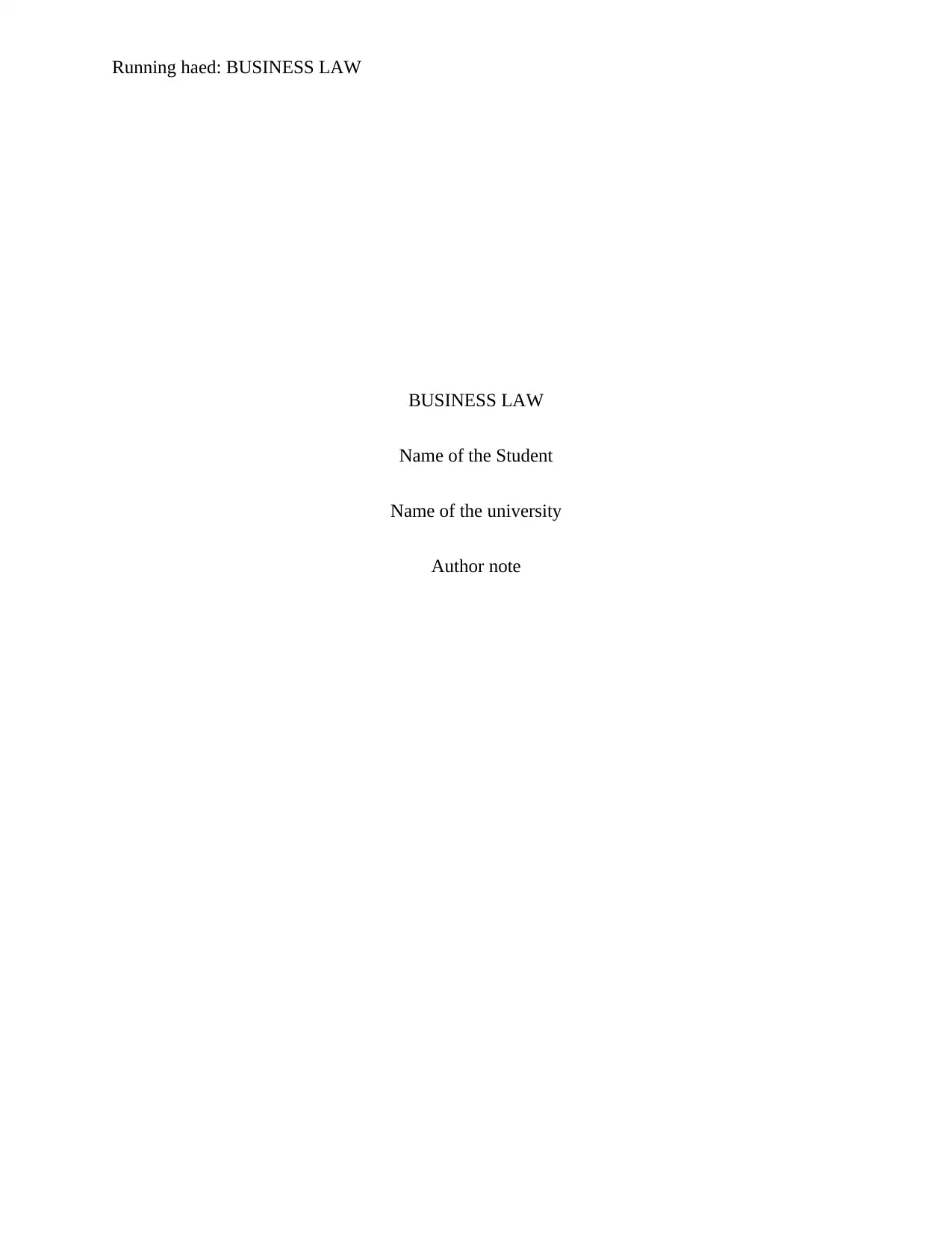
Running haed: BUSINESS LAW
BUSINESS LAW
Name of the Student
Name of the university
Author note
BUSINESS LAW
Name of the Student
Name of the university
Author note
Secure Best Marks with AI Grader
Need help grading? Try our AI Grader for instant feedback on your assignments.
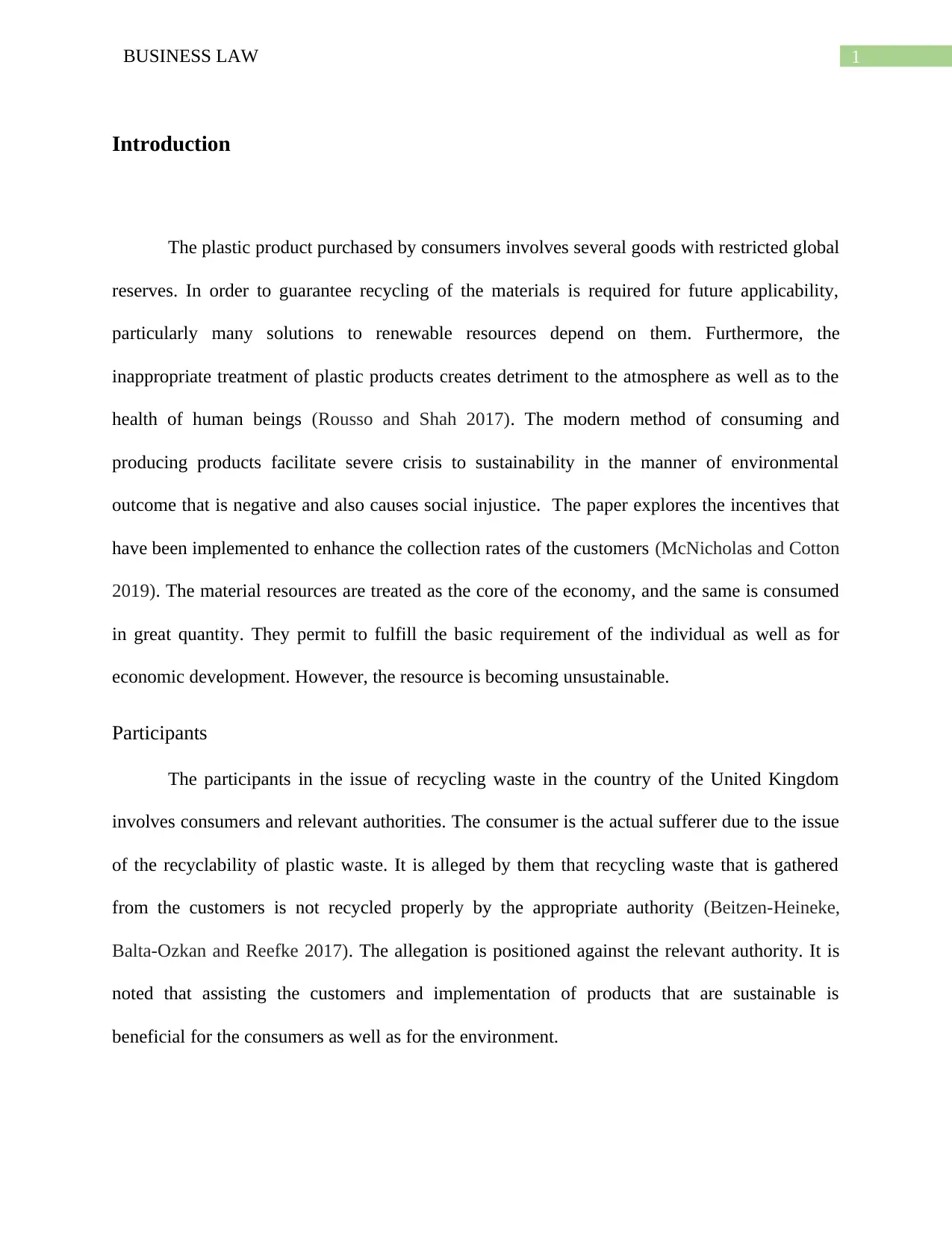
1BUSINESS LAW
Introduction
The plastic product purchased by consumers involves several goods with restricted global
reserves. In order to guarantee recycling of the materials is required for future applicability,
particularly many solutions to renewable resources depend on them. Furthermore, the
inappropriate treatment of plastic products creates detriment to the atmosphere as well as to the
health of human beings (Rousso and Shah 2017). The modern method of consuming and
producing products facilitate severe crisis to sustainability in the manner of environmental
outcome that is negative and also causes social injustice. The paper explores the incentives that
have been implemented to enhance the collection rates of the customers (McNicholas and Cotton
2019). The material resources are treated as the core of the economy, and the same is consumed
in great quantity. They permit to fulfill the basic requirement of the individual as well as for
economic development. However, the resource is becoming unsustainable.
Participants
The participants in the issue of recycling waste in the country of the United Kingdom
involves consumers and relevant authorities. The consumer is the actual sufferer due to the issue
of the recyclability of plastic waste. It is alleged by them that recycling waste that is gathered
from the customers is not recycled properly by the appropriate authority (Beitzen-Heineke,
Balta-Ozkan and Reefke 2017). The allegation is positioned against the relevant authority. It is
noted that assisting the customers and implementation of products that are sustainable is
beneficial for the consumers as well as for the environment.
Introduction
The plastic product purchased by consumers involves several goods with restricted global
reserves. In order to guarantee recycling of the materials is required for future applicability,
particularly many solutions to renewable resources depend on them. Furthermore, the
inappropriate treatment of plastic products creates detriment to the atmosphere as well as to the
health of human beings (Rousso and Shah 2017). The modern method of consuming and
producing products facilitate severe crisis to sustainability in the manner of environmental
outcome that is negative and also causes social injustice. The paper explores the incentives that
have been implemented to enhance the collection rates of the customers (McNicholas and Cotton
2019). The material resources are treated as the core of the economy, and the same is consumed
in great quantity. They permit to fulfill the basic requirement of the individual as well as for
economic development. However, the resource is becoming unsustainable.
Participants
The participants in the issue of recycling waste in the country of the United Kingdom
involves consumers and relevant authorities. The consumer is the actual sufferer due to the issue
of the recyclability of plastic waste. It is alleged by them that recycling waste that is gathered
from the customers is not recycled properly by the appropriate authority (Beitzen-Heineke,
Balta-Ozkan and Reefke 2017). The allegation is positioned against the relevant authority. It is
noted that assisting the customers and implementation of products that are sustainable is
beneficial for the consumers as well as for the environment.
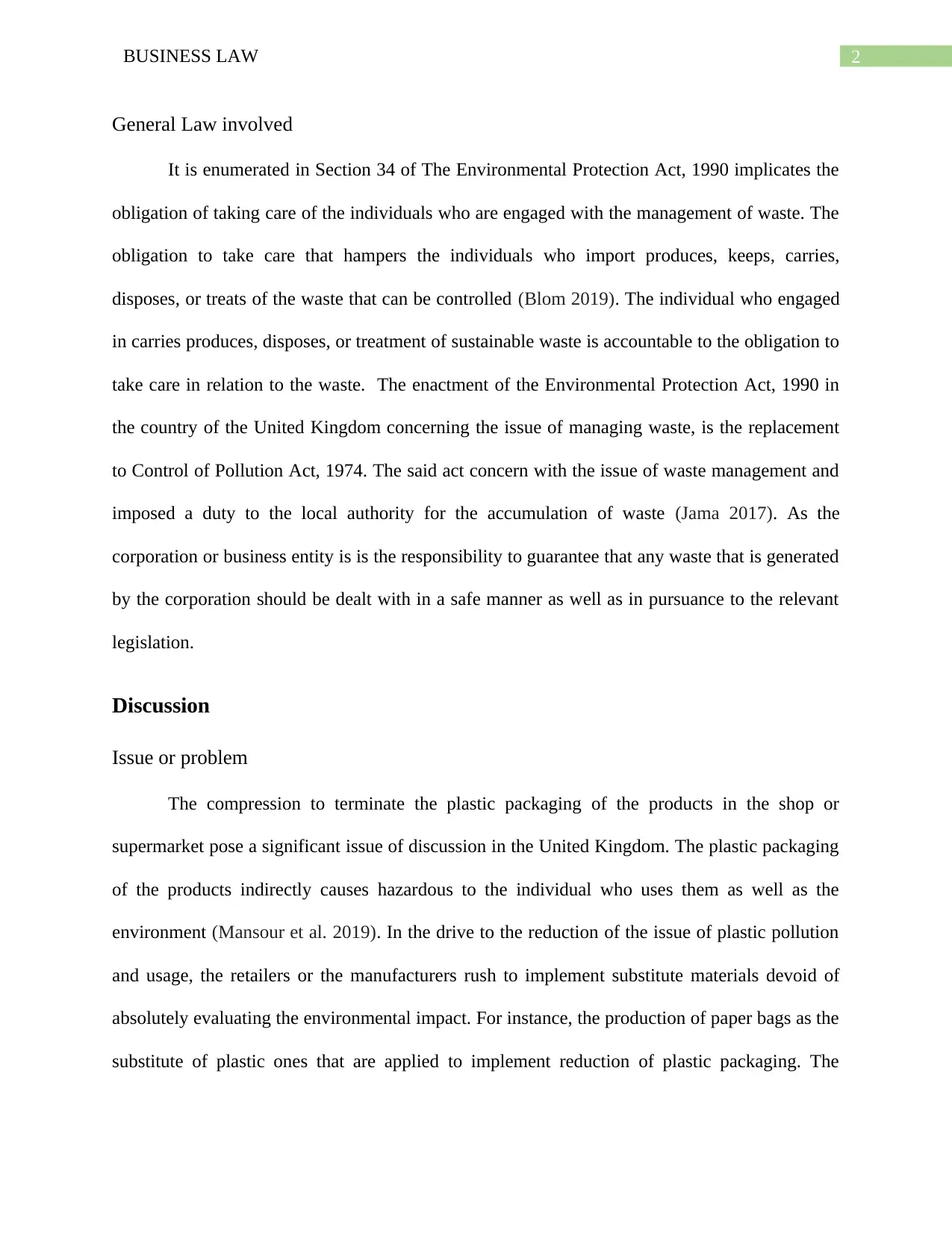
2BUSINESS LAW
General Law involved
It is enumerated in Section 34 of The Environmental Protection Act, 1990 implicates the
obligation of taking care of the individuals who are engaged with the management of waste. The
obligation to take care that hampers the individuals who import produces, keeps, carries,
disposes, or treats of the waste that can be controlled (Blom 2019). The individual who engaged
in carries produces, disposes, or treatment of sustainable waste is accountable to the obligation to
take care in relation to the waste. The enactment of the Environmental Protection Act, 1990 in
the country of the United Kingdom concerning the issue of managing waste, is the replacement
to Control of Pollution Act, 1974. The said act concern with the issue of waste management and
imposed a duty to the local authority for the accumulation of waste (Jama 2017). As the
corporation or business entity is is the responsibility to guarantee that any waste that is generated
by the corporation should be dealt with in a safe manner as well as in pursuance to the relevant
legislation.
Discussion
Issue or problem
The compression to terminate the plastic packaging of the products in the shop or
supermarket pose a significant issue of discussion in the United Kingdom. The plastic packaging
of the products indirectly causes hazardous to the individual who uses them as well as the
environment (Mansour et al. 2019). In the drive to the reduction of the issue of plastic pollution
and usage, the retailers or the manufacturers rush to implement substitute materials devoid of
absolutely evaluating the environmental impact. For instance, the production of paper bags as the
substitute of plastic ones that are applied to implement reduction of plastic packaging. The
General Law involved
It is enumerated in Section 34 of The Environmental Protection Act, 1990 implicates the
obligation of taking care of the individuals who are engaged with the management of waste. The
obligation to take care that hampers the individuals who import produces, keeps, carries,
disposes, or treats of the waste that can be controlled (Blom 2019). The individual who engaged
in carries produces, disposes, or treatment of sustainable waste is accountable to the obligation to
take care in relation to the waste. The enactment of the Environmental Protection Act, 1990 in
the country of the United Kingdom concerning the issue of managing waste, is the replacement
to Control of Pollution Act, 1974. The said act concern with the issue of waste management and
imposed a duty to the local authority for the accumulation of waste (Jama 2017). As the
corporation or business entity is is the responsibility to guarantee that any waste that is generated
by the corporation should be dealt with in a safe manner as well as in pursuance to the relevant
legislation.
Discussion
Issue or problem
The compression to terminate the plastic packaging of the products in the shop or
supermarket pose a significant issue of discussion in the United Kingdom. The plastic packaging
of the products indirectly causes hazardous to the individual who uses them as well as the
environment (Mansour et al. 2019). In the drive to the reduction of the issue of plastic pollution
and usage, the retailers or the manufacturers rush to implement substitute materials devoid of
absolutely evaluating the environmental impact. For instance, the production of paper bags as the
substitute of plastic ones that are applied to implement reduction of plastic packaging. The
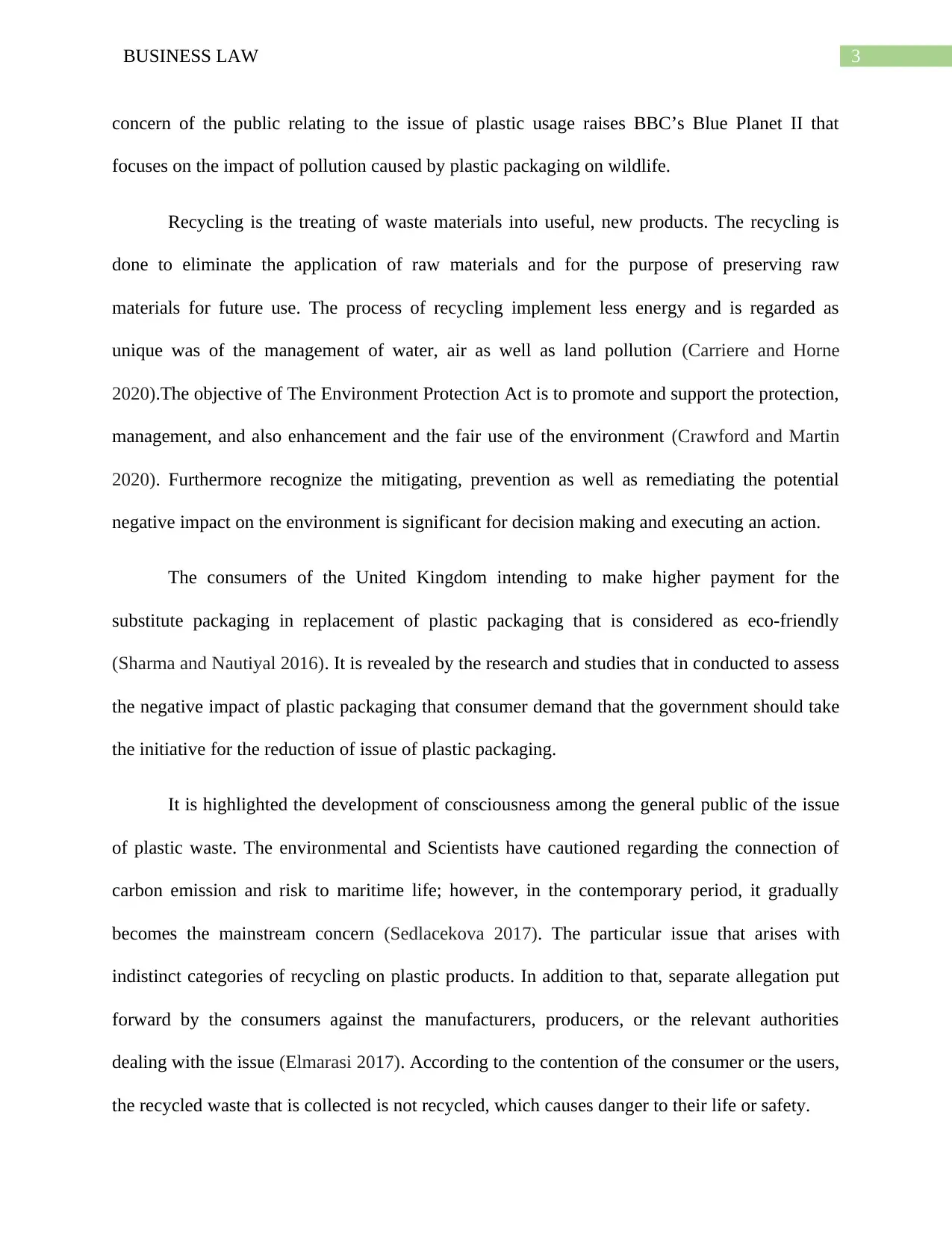
3BUSINESS LAW
concern of the public relating to the issue of plastic usage raises BBC’s Blue Planet II that
focuses on the impact of pollution caused by plastic packaging on wildlife.
Recycling is the treating of waste materials into useful, new products. The recycling is
done to eliminate the application of raw materials and for the purpose of preserving raw
materials for future use. The process of recycling implement less energy and is regarded as
unique was of the management of water, air as well as land pollution (Carriere and Horne
2020).The objective of The Environment Protection Act is to promote and support the protection,
management, and also enhancement and the fair use of the environment (Crawford and Martin
2020). Furthermore recognize the mitigating, prevention as well as remediating the potential
negative impact on the environment is significant for decision making and executing an action.
The consumers of the United Kingdom intending to make higher payment for the
substitute packaging in replacement of plastic packaging that is considered as eco-friendly
(Sharma and Nautiyal 2016). It is revealed by the research and studies that in conducted to assess
the negative impact of plastic packaging that consumer demand that the government should take
the initiative for the reduction of issue of plastic packaging.
It is highlighted the development of consciousness among the general public of the issue
of plastic waste. The environmental and Scientists have cautioned regarding the connection of
carbon emission and risk to maritime life; however, in the contemporary period, it gradually
becomes the mainstream concern (Sedlacekova 2017). The particular issue that arises with
indistinct categories of recycling on plastic products. In addition to that, separate allegation put
forward by the consumers against the manufacturers, producers, or the relevant authorities
dealing with the issue (Elmarasi 2017). According to the contention of the consumer or the users,
the recycled waste that is collected is not recycled, which causes danger to their life or safety.
concern of the public relating to the issue of plastic usage raises BBC’s Blue Planet II that
focuses on the impact of pollution caused by plastic packaging on wildlife.
Recycling is the treating of waste materials into useful, new products. The recycling is
done to eliminate the application of raw materials and for the purpose of preserving raw
materials for future use. The process of recycling implement less energy and is regarded as
unique was of the management of water, air as well as land pollution (Carriere and Horne
2020).The objective of The Environment Protection Act is to promote and support the protection,
management, and also enhancement and the fair use of the environment (Crawford and Martin
2020). Furthermore recognize the mitigating, prevention as well as remediating the potential
negative impact on the environment is significant for decision making and executing an action.
The consumers of the United Kingdom intending to make higher payment for the
substitute packaging in replacement of plastic packaging that is considered as eco-friendly
(Sharma and Nautiyal 2016). It is revealed by the research and studies that in conducted to assess
the negative impact of plastic packaging that consumer demand that the government should take
the initiative for the reduction of issue of plastic packaging.
It is highlighted the development of consciousness among the general public of the issue
of plastic waste. The environmental and Scientists have cautioned regarding the connection of
carbon emission and risk to maritime life; however, in the contemporary period, it gradually
becomes the mainstream concern (Sedlacekova 2017). The particular issue that arises with
indistinct categories of recycling on plastic products. In addition to that, separate allegation put
forward by the consumers against the manufacturers, producers, or the relevant authorities
dealing with the issue (Elmarasi 2017). According to the contention of the consumer or the users,
the recycled waste that is collected is not recycled, which causes danger to their life or safety.
Secure Best Marks with AI Grader
Need help grading? Try our AI Grader for instant feedback on your assignments.
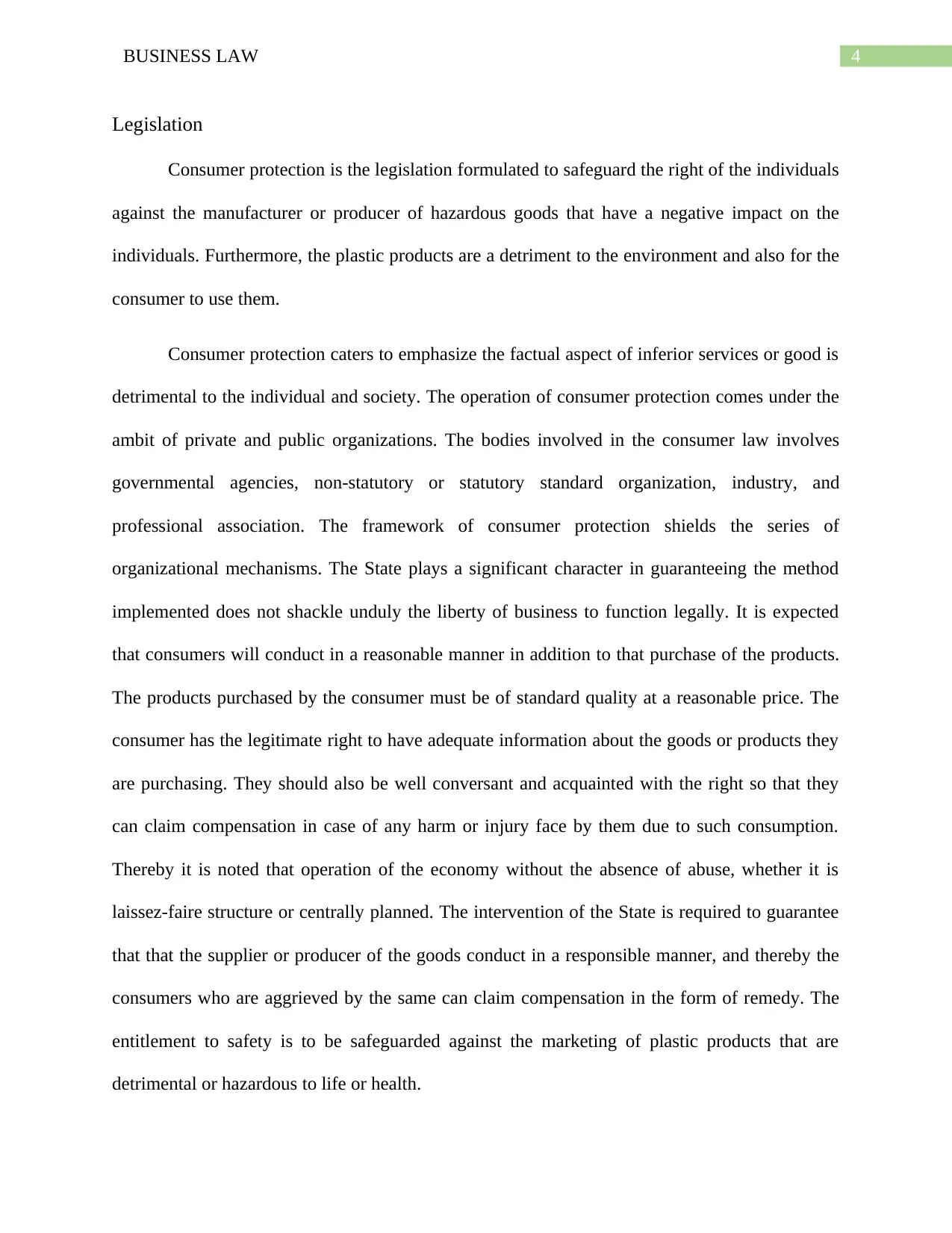
4BUSINESS LAW
Legislation
Consumer protection is the legislation formulated to safeguard the right of the individuals
against the manufacturer or producer of hazardous goods that have a negative impact on the
individuals. Furthermore, the plastic products are a detriment to the environment and also for the
consumer to use them.
Consumer protection caters to emphasize the factual aspect of inferior services or good is
detrimental to the individual and society. The operation of consumer protection comes under the
ambit of private and public organizations. The bodies involved in the consumer law involves
governmental agencies, non-statutory or statutory standard organization, industry, and
professional association. The framework of consumer protection shields the series of
organizational mechanisms. The State plays a significant character in guaranteeing the method
implemented does not shackle unduly the liberty of business to function legally. It is expected
that consumers will conduct in a reasonable manner in addition to that purchase of the products.
The products purchased by the consumer must be of standard quality at a reasonable price. The
consumer has the legitimate right to have adequate information about the goods or products they
are purchasing. They should also be well conversant and acquainted with the right so that they
can claim compensation in case of any harm or injury face by them due to such consumption.
Thereby it is noted that operation of the economy without the absence of abuse, whether it is
laissez-faire structure or centrally planned. The intervention of the State is required to guarantee
that that the supplier or producer of the goods conduct in a responsible manner, and thereby the
consumers who are aggrieved by the same can claim compensation in the form of remedy. The
entitlement to safety is to be safeguarded against the marketing of plastic products that are
detrimental or hazardous to life or health.
Legislation
Consumer protection is the legislation formulated to safeguard the right of the individuals
against the manufacturer or producer of hazardous goods that have a negative impact on the
individuals. Furthermore, the plastic products are a detriment to the environment and also for the
consumer to use them.
Consumer protection caters to emphasize the factual aspect of inferior services or good is
detrimental to the individual and society. The operation of consumer protection comes under the
ambit of private and public organizations. The bodies involved in the consumer law involves
governmental agencies, non-statutory or statutory standard organization, industry, and
professional association. The framework of consumer protection shields the series of
organizational mechanisms. The State plays a significant character in guaranteeing the method
implemented does not shackle unduly the liberty of business to function legally. It is expected
that consumers will conduct in a reasonable manner in addition to that purchase of the products.
The products purchased by the consumer must be of standard quality at a reasonable price. The
consumer has the legitimate right to have adequate information about the goods or products they
are purchasing. They should also be well conversant and acquainted with the right so that they
can claim compensation in case of any harm or injury face by them due to such consumption.
Thereby it is noted that operation of the economy without the absence of abuse, whether it is
laissez-faire structure or centrally planned. The intervention of the State is required to guarantee
that that the supplier or producer of the goods conduct in a responsible manner, and thereby the
consumers who are aggrieved by the same can claim compensation in the form of remedy. The
entitlement to safety is to be safeguarded against the marketing of plastic products that are
detrimental or hazardous to life or health.
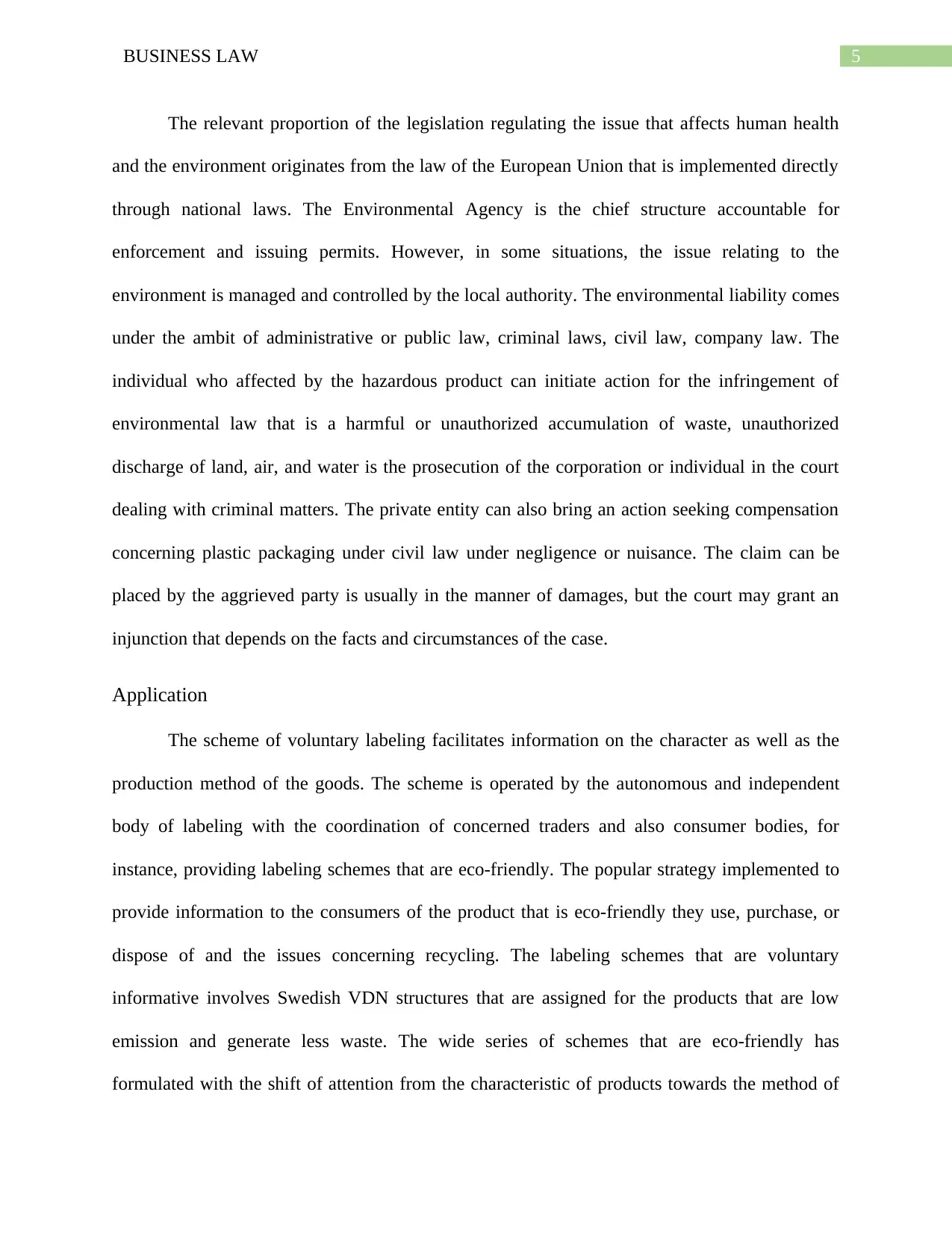
5BUSINESS LAW
The relevant proportion of the legislation regulating the issue that affects human health
and the environment originates from the law of the European Union that is implemented directly
through national laws. The Environmental Agency is the chief structure accountable for
enforcement and issuing permits. However, in some situations, the issue relating to the
environment is managed and controlled by the local authority. The environmental liability comes
under the ambit of administrative or public law, criminal laws, civil law, company law. The
individual who affected by the hazardous product can initiate action for the infringement of
environmental law that is a harmful or unauthorized accumulation of waste, unauthorized
discharge of land, air, and water is the prosecution of the corporation or individual in the court
dealing with criminal matters. The private entity can also bring an action seeking compensation
concerning plastic packaging under civil law under negligence or nuisance. The claim can be
placed by the aggrieved party is usually in the manner of damages, but the court may grant an
injunction that depends on the facts and circumstances of the case.
Application
The scheme of voluntary labeling facilitates information on the character as well as the
production method of the goods. The scheme is operated by the autonomous and independent
body of labeling with the coordination of concerned traders and also consumer bodies, for
instance, providing labeling schemes that are eco-friendly. The popular strategy implemented to
provide information to the consumers of the product that is eco-friendly they use, purchase, or
dispose of and the issues concerning recycling. The labeling schemes that are voluntary
informative involves Swedish VDN structures that are assigned for the products that are low
emission and generate less waste. The wide series of schemes that are eco-friendly has
formulated with the shift of attention from the characteristic of products towards the method of
The relevant proportion of the legislation regulating the issue that affects human health
and the environment originates from the law of the European Union that is implemented directly
through national laws. The Environmental Agency is the chief structure accountable for
enforcement and issuing permits. However, in some situations, the issue relating to the
environment is managed and controlled by the local authority. The environmental liability comes
under the ambit of administrative or public law, criminal laws, civil law, company law. The
individual who affected by the hazardous product can initiate action for the infringement of
environmental law that is a harmful or unauthorized accumulation of waste, unauthorized
discharge of land, air, and water is the prosecution of the corporation or individual in the court
dealing with criminal matters. The private entity can also bring an action seeking compensation
concerning plastic packaging under civil law under negligence or nuisance. The claim can be
placed by the aggrieved party is usually in the manner of damages, but the court may grant an
injunction that depends on the facts and circumstances of the case.
Application
The scheme of voluntary labeling facilitates information on the character as well as the
production method of the goods. The scheme is operated by the autonomous and independent
body of labeling with the coordination of concerned traders and also consumer bodies, for
instance, providing labeling schemes that are eco-friendly. The popular strategy implemented to
provide information to the consumers of the product that is eco-friendly they use, purchase, or
dispose of and the issues concerning recycling. The labeling schemes that are voluntary
informative involves Swedish VDN structures that are assigned for the products that are low
emission and generate less waste. The wide series of schemes that are eco-friendly has
formulated with the shift of attention from the characteristic of products towards the method of
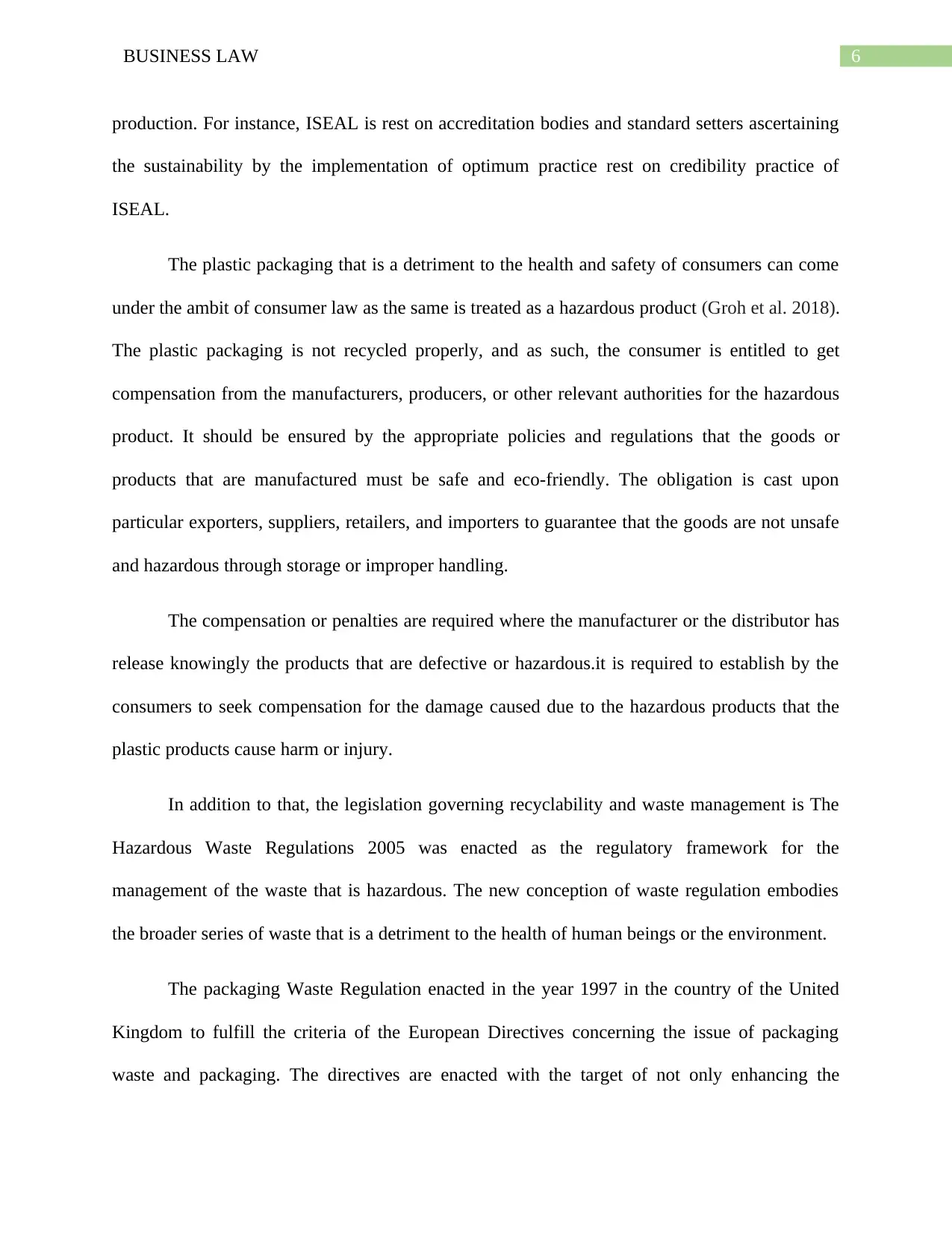
6BUSINESS LAW
production. For instance, ISEAL is rest on accreditation bodies and standard setters ascertaining
the sustainability by the implementation of optimum practice rest on credibility practice of
ISEAL.
The plastic packaging that is a detriment to the health and safety of consumers can come
under the ambit of consumer law as the same is treated as a hazardous product (Groh et al. 2018).
The plastic packaging is not recycled properly, and as such, the consumer is entitled to get
compensation from the manufacturers, producers, or other relevant authorities for the hazardous
product. It should be ensured by the appropriate policies and regulations that the goods or
products that are manufactured must be safe and eco-friendly. The obligation is cast upon
particular exporters, suppliers, retailers, and importers to guarantee that the goods are not unsafe
and hazardous through storage or improper handling.
The compensation or penalties are required where the manufacturer or the distributor has
release knowingly the products that are defective or hazardous.it is required to establish by the
consumers to seek compensation for the damage caused due to the hazardous products that the
plastic products cause harm or injury.
In addition to that, the legislation governing recyclability and waste management is The
Hazardous Waste Regulations 2005 was enacted as the regulatory framework for the
management of the waste that is hazardous. The new conception of waste regulation embodies
the broader series of waste that is a detriment to the health of human beings or the environment.
The packaging Waste Regulation enacted in the year 1997 in the country of the United
Kingdom to fulfill the criteria of the European Directives concerning the issue of packaging
waste and packaging. The directives are enacted with the target of not only enhancing the
production. For instance, ISEAL is rest on accreditation bodies and standard setters ascertaining
the sustainability by the implementation of optimum practice rest on credibility practice of
ISEAL.
The plastic packaging that is a detriment to the health and safety of consumers can come
under the ambit of consumer law as the same is treated as a hazardous product (Groh et al. 2018).
The plastic packaging is not recycled properly, and as such, the consumer is entitled to get
compensation from the manufacturers, producers, or other relevant authorities for the hazardous
product. It should be ensured by the appropriate policies and regulations that the goods or
products that are manufactured must be safe and eco-friendly. The obligation is cast upon
particular exporters, suppliers, retailers, and importers to guarantee that the goods are not unsafe
and hazardous through storage or improper handling.
The compensation or penalties are required where the manufacturer or the distributor has
release knowingly the products that are defective or hazardous.it is required to establish by the
consumers to seek compensation for the damage caused due to the hazardous products that the
plastic products cause harm or injury.
In addition to that, the legislation governing recyclability and waste management is The
Hazardous Waste Regulations 2005 was enacted as the regulatory framework for the
management of the waste that is hazardous. The new conception of waste regulation embodies
the broader series of waste that is a detriment to the health of human beings or the environment.
The packaging Waste Regulation enacted in the year 1997 in the country of the United
Kingdom to fulfill the criteria of the European Directives concerning the issue of packaging
waste and packaging. The directives are enacted with the target of not only enhancing the
Paraphrase This Document
Need a fresh take? Get an instant paraphrase of this document with our AI Paraphraser
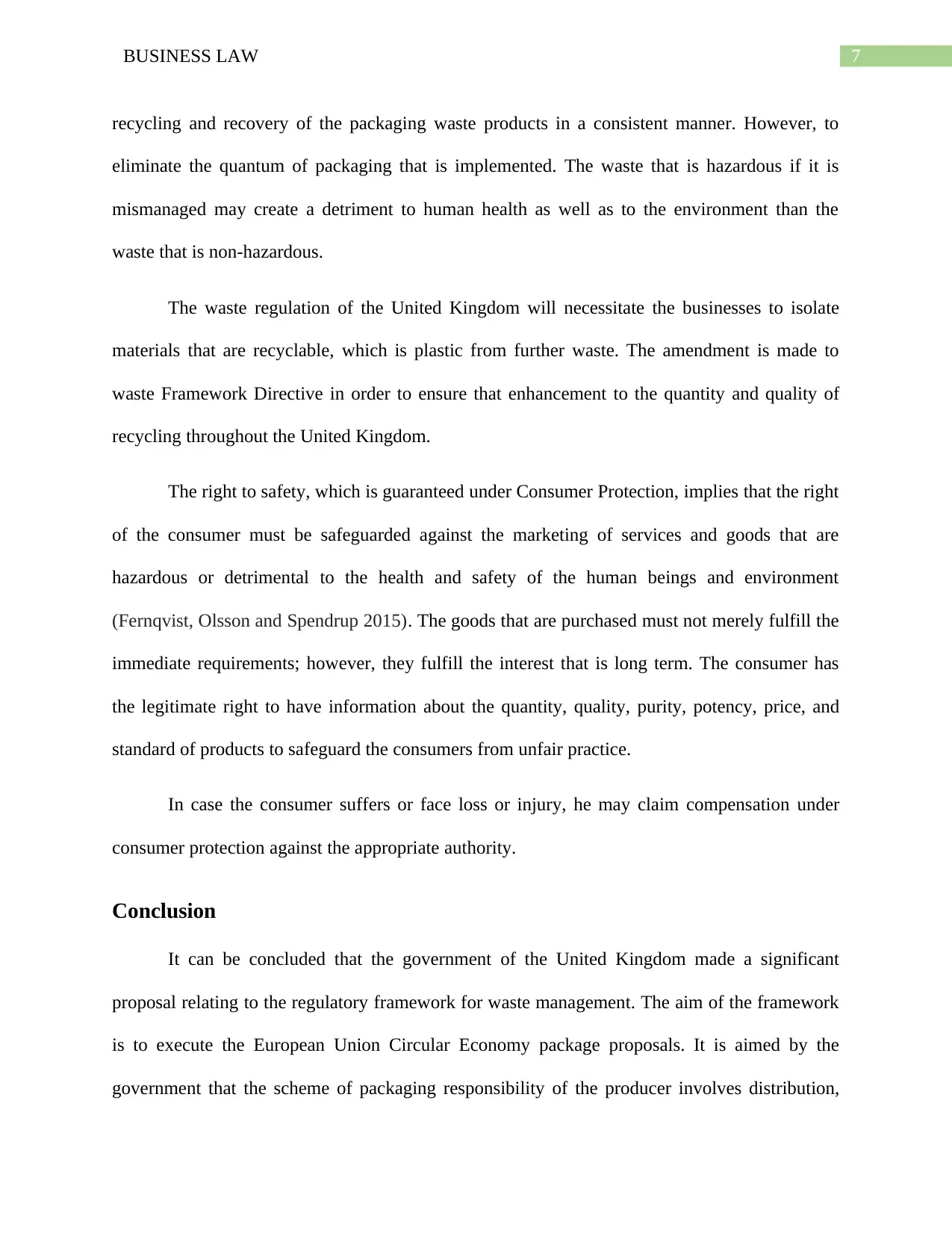
7BUSINESS LAW
recycling and recovery of the packaging waste products in a consistent manner. However, to
eliminate the quantum of packaging that is implemented. The waste that is hazardous if it is
mismanaged may create a detriment to human health as well as to the environment than the
waste that is non-hazardous.
The waste regulation of the United Kingdom will necessitate the businesses to isolate
materials that are recyclable, which is plastic from further waste. The amendment is made to
waste Framework Directive in order to ensure that enhancement to the quantity and quality of
recycling throughout the United Kingdom.
The right to safety, which is guaranteed under Consumer Protection, implies that the right
of the consumer must be safeguarded against the marketing of services and goods that are
hazardous or detrimental to the health and safety of the human beings and environment
(Fernqvist, Olsson and Spendrup 2015). The goods that are purchased must not merely fulfill the
immediate requirements; however, they fulfill the interest that is long term. The consumer has
the legitimate right to have information about the quantity, quality, purity, potency, price, and
standard of products to safeguard the consumers from unfair practice.
In case the consumer suffers or face loss or injury, he may claim compensation under
consumer protection against the appropriate authority.
Conclusion
It can be concluded that the government of the United Kingdom made a significant
proposal relating to the regulatory framework for waste management. The aim of the framework
is to execute the European Union Circular Economy package proposals. It is aimed by the
government that the scheme of packaging responsibility of the producer involves distribution,
recycling and recovery of the packaging waste products in a consistent manner. However, to
eliminate the quantum of packaging that is implemented. The waste that is hazardous if it is
mismanaged may create a detriment to human health as well as to the environment than the
waste that is non-hazardous.
The waste regulation of the United Kingdom will necessitate the businesses to isolate
materials that are recyclable, which is plastic from further waste. The amendment is made to
waste Framework Directive in order to ensure that enhancement to the quantity and quality of
recycling throughout the United Kingdom.
The right to safety, which is guaranteed under Consumer Protection, implies that the right
of the consumer must be safeguarded against the marketing of services and goods that are
hazardous or detrimental to the health and safety of the human beings and environment
(Fernqvist, Olsson and Spendrup 2015). The goods that are purchased must not merely fulfill the
immediate requirements; however, they fulfill the interest that is long term. The consumer has
the legitimate right to have information about the quantity, quality, purity, potency, price, and
standard of products to safeguard the consumers from unfair practice.
In case the consumer suffers or face loss or injury, he may claim compensation under
consumer protection against the appropriate authority.
Conclusion
It can be concluded that the government of the United Kingdom made a significant
proposal relating to the regulatory framework for waste management. The aim of the framework
is to execute the European Union Circular Economy package proposals. It is aimed by the
government that the scheme of packaging responsibility of the producer involves distribution,
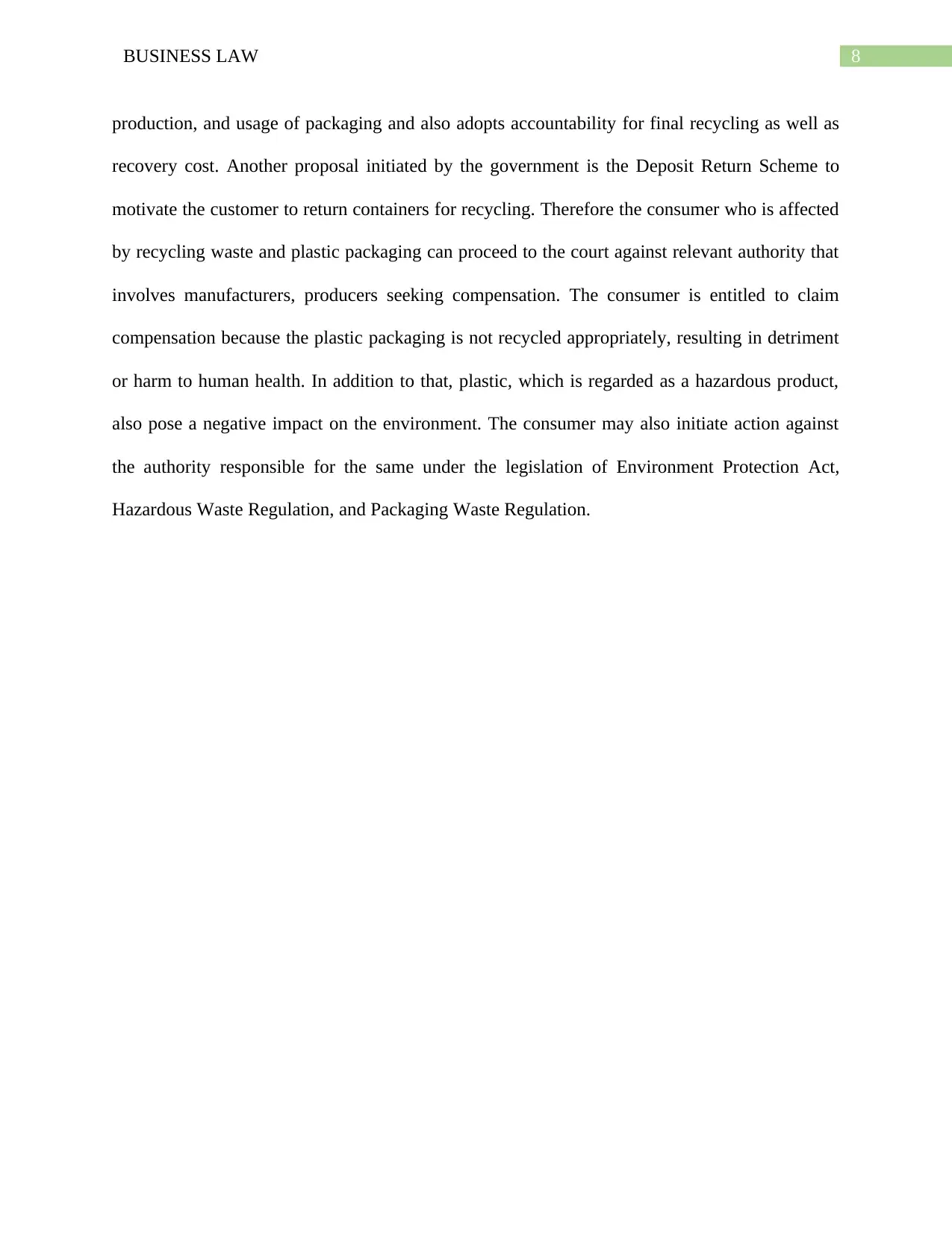
8BUSINESS LAW
production, and usage of packaging and also adopts accountability for final recycling as well as
recovery cost. Another proposal initiated by the government is the Deposit Return Scheme to
motivate the customer to return containers for recycling. Therefore the consumer who is affected
by recycling waste and plastic packaging can proceed to the court against relevant authority that
involves manufacturers, producers seeking compensation. The consumer is entitled to claim
compensation because the plastic packaging is not recycled appropriately, resulting in detriment
or harm to human health. In addition to that, plastic, which is regarded as a hazardous product,
also pose a negative impact on the environment. The consumer may also initiate action against
the authority responsible for the same under the legislation of Environment Protection Act,
Hazardous Waste Regulation, and Packaging Waste Regulation.
production, and usage of packaging and also adopts accountability for final recycling as well as
recovery cost. Another proposal initiated by the government is the Deposit Return Scheme to
motivate the customer to return containers for recycling. Therefore the consumer who is affected
by recycling waste and plastic packaging can proceed to the court against relevant authority that
involves manufacturers, producers seeking compensation. The consumer is entitled to claim
compensation because the plastic packaging is not recycled appropriately, resulting in detriment
or harm to human health. In addition to that, plastic, which is regarded as a hazardous product,
also pose a negative impact on the environment. The consumer may also initiate action against
the authority responsible for the same under the legislation of Environment Protection Act,
Hazardous Waste Regulation, and Packaging Waste Regulation.
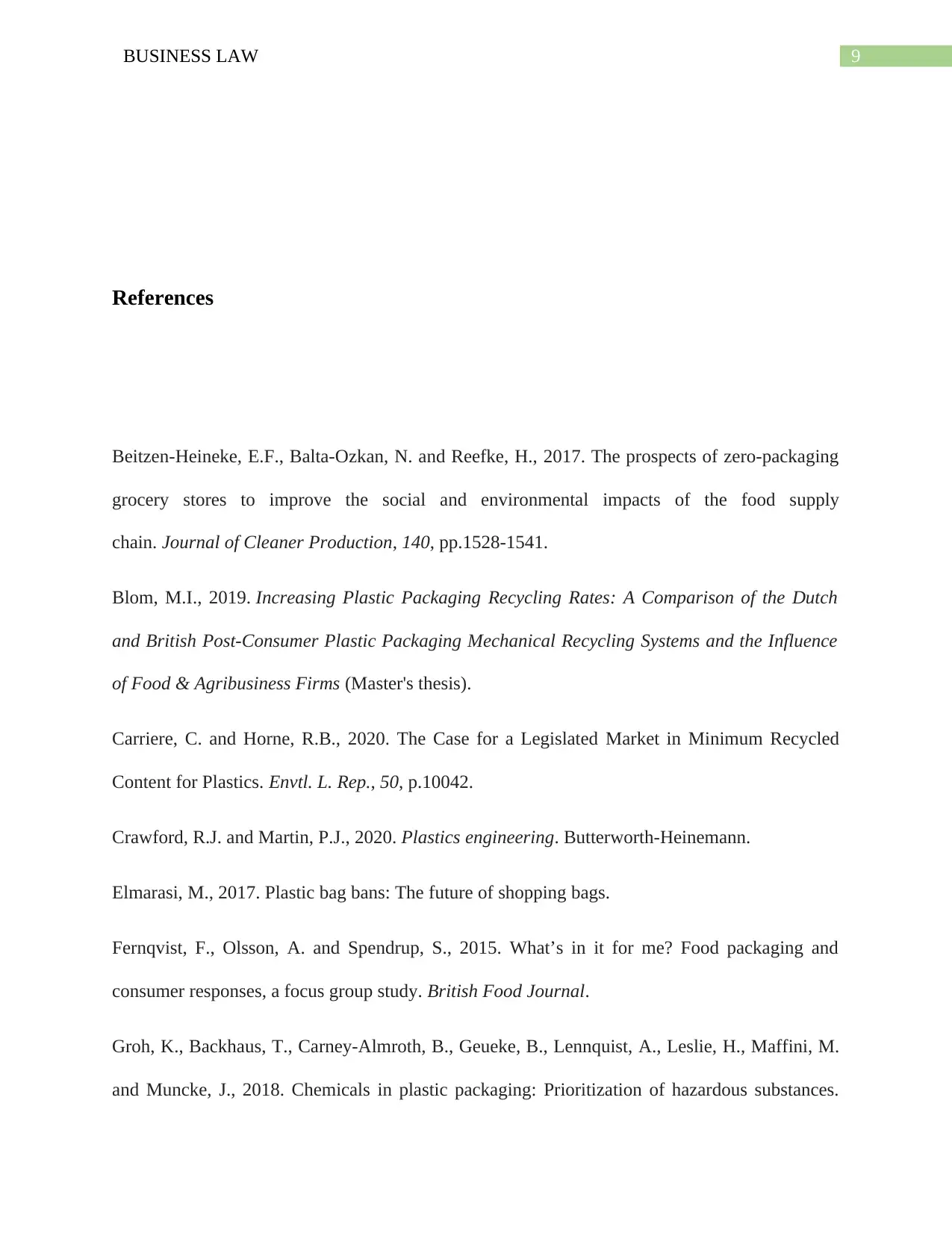
9BUSINESS LAW
References
Beitzen-Heineke, E.F., Balta-Ozkan, N. and Reefke, H., 2017. The prospects of zero-packaging
grocery stores to improve the social and environmental impacts of the food supply
chain. Journal of Cleaner Production, 140, pp.1528-1541.
Blom, M.I., 2019. Increasing Plastic Packaging Recycling Rates: A Comparison of the Dutch
and British Post-Consumer Plastic Packaging Mechanical Recycling Systems and the Influence
of Food & Agribusiness Firms (Master's thesis).
Carriere, C. and Horne, R.B., 2020. The Case for a Legislated Market in Minimum Recycled
Content for Plastics. Envtl. L. Rep., 50, p.10042.
Crawford, R.J. and Martin, P.J., 2020. Plastics engineering. Butterworth-Heinemann.
Elmarasi, M., 2017. Plastic bag bans: The future of shopping bags.
Fernqvist, F., Olsson, A. and Spendrup, S., 2015. What’s in it for me? Food packaging and
consumer responses, a focus group study. British Food Journal.
Groh, K., Backhaus, T., Carney-Almroth, B., Geueke, B., Lennquist, A., Leslie, H., Maffini, M.
and Muncke, J., 2018. Chemicals in plastic packaging: Prioritization of hazardous substances.
References
Beitzen-Heineke, E.F., Balta-Ozkan, N. and Reefke, H., 2017. The prospects of zero-packaging
grocery stores to improve the social and environmental impacts of the food supply
chain. Journal of Cleaner Production, 140, pp.1528-1541.
Blom, M.I., 2019. Increasing Plastic Packaging Recycling Rates: A Comparison of the Dutch
and British Post-Consumer Plastic Packaging Mechanical Recycling Systems and the Influence
of Food & Agribusiness Firms (Master's thesis).
Carriere, C. and Horne, R.B., 2020. The Case for a Legislated Market in Minimum Recycled
Content for Plastics. Envtl. L. Rep., 50, p.10042.
Crawford, R.J. and Martin, P.J., 2020. Plastics engineering. Butterworth-Heinemann.
Elmarasi, M., 2017. Plastic bag bans: The future of shopping bags.
Fernqvist, F., Olsson, A. and Spendrup, S., 2015. What’s in it for me? Food packaging and
consumer responses, a focus group study. British Food Journal.
Groh, K., Backhaus, T., Carney-Almroth, B., Geueke, B., Lennquist, A., Leslie, H., Maffini, M.
and Muncke, J., 2018. Chemicals in plastic packaging: Prioritization of hazardous substances.
Secure Best Marks with AI Grader
Need help grading? Try our AI Grader for instant feedback on your assignments.
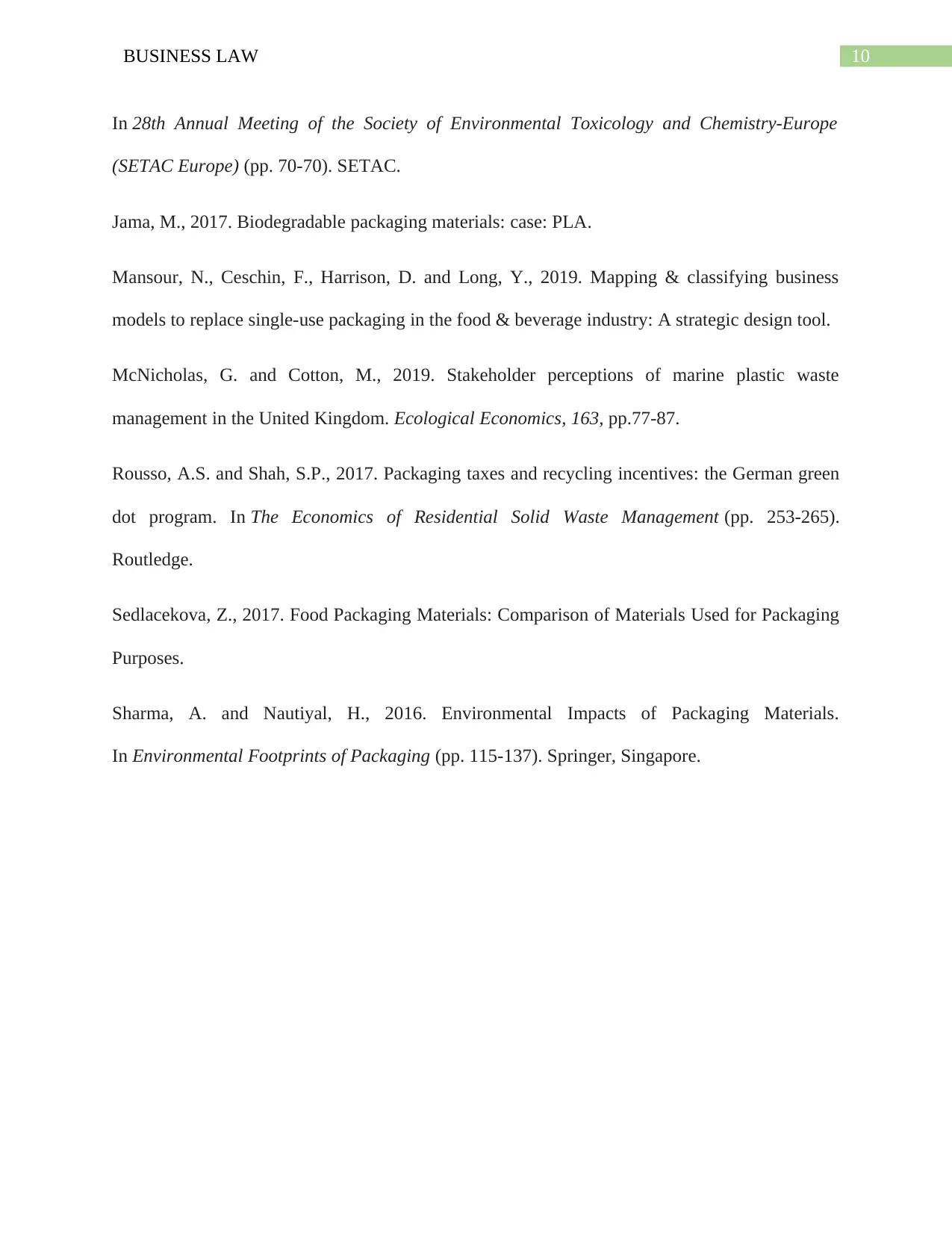
10BUSINESS LAW
In 28th Annual Meeting of the Society of Environmental Toxicology and Chemistry-Europe
(SETAC Europe) (pp. 70-70). SETAC.
Jama, M., 2017. Biodegradable packaging materials: case: PLA.
Mansour, N., Ceschin, F., Harrison, D. and Long, Y., 2019. Mapping & classifying business
models to replace single-use packaging in the food & beverage industry: A strategic design tool.
McNicholas, G. and Cotton, M., 2019. Stakeholder perceptions of marine plastic waste
management in the United Kingdom. Ecological Economics, 163, pp.77-87.
Rousso, A.S. and Shah, S.P., 2017. Packaging taxes and recycling incentives: the German green
dot program. In The Economics of Residential Solid Waste Management (pp. 253-265).
Routledge.
Sedlacekova, Z., 2017. Food Packaging Materials: Comparison of Materials Used for Packaging
Purposes.
Sharma, A. and Nautiyal, H., 2016. Environmental Impacts of Packaging Materials.
In Environmental Footprints of Packaging (pp. 115-137). Springer, Singapore.
In 28th Annual Meeting of the Society of Environmental Toxicology and Chemistry-Europe
(SETAC Europe) (pp. 70-70). SETAC.
Jama, M., 2017. Biodegradable packaging materials: case: PLA.
Mansour, N., Ceschin, F., Harrison, D. and Long, Y., 2019. Mapping & classifying business
models to replace single-use packaging in the food & beverage industry: A strategic design tool.
McNicholas, G. and Cotton, M., 2019. Stakeholder perceptions of marine plastic waste
management in the United Kingdom. Ecological Economics, 163, pp.77-87.
Rousso, A.S. and Shah, S.P., 2017. Packaging taxes and recycling incentives: the German green
dot program. In The Economics of Residential Solid Waste Management (pp. 253-265).
Routledge.
Sedlacekova, Z., 2017. Food Packaging Materials: Comparison of Materials Used for Packaging
Purposes.
Sharma, A. and Nautiyal, H., 2016. Environmental Impacts of Packaging Materials.
In Environmental Footprints of Packaging (pp. 115-137). Springer, Singapore.
1 out of 11
Related Documents
Your All-in-One AI-Powered Toolkit for Academic Success.
+13062052269
info@desklib.com
Available 24*7 on WhatsApp / Email
![[object Object]](/_next/static/media/star-bottom.7253800d.svg)
Unlock your academic potential
© 2024 | Zucol Services PVT LTD | All rights reserved.





